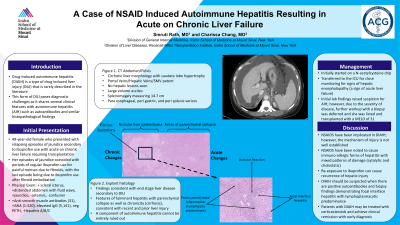Monday Poster Session
Category: Liver
P3052 - A Case of Ibuprofen Induced Autoimmune Hepatitis Resulting in Acute on Chronic Liver Failure
Monday, October 28, 2024
10:30 AM - 4:00 PM ET
Location: Exhibit Hall E

Has Audio

Smruthi Rath, MD
Icahn School of Medicine at Mount Sinai
New York, NY
Presenting Author(s)
Smruti Rath, MD, Charissa Chang, MD
Icahn School of Medicine at Mount Sinai, New York, NY
Introduction: Drug-induced autoimmune hepatitis (DIAIH) is a type of drug induced liver injury (DILI) that is rarely described in the literature. This form of DILI often poses diagnostic challenges as it shares clinical features similar to autoimmune hepatitis (AIH) such as autoantibodies and histopathological findings. We present a case of a 49-year-old female with a history of fibroids and relapsing episodes of jaundice secondary to ibuprofen use and ultimately, acute on chronic liver failure requiring transplantation. There are currently no articles in the literature describing DIAIH secondary to ibuprofen use that progressed to liver failure.
Case Description/Methods: On presentation, she was noted to have scleral icterus, jaundice, and ascites, but no encephalopathy. Admission labs were significant for AST 363, ALT 143, total bilirubin 12.5, and direct bilirubin 8.0. Her MELD-Na score on presentation was 31. Her initial presentation for jaundice had been one year prior after ibuprofen use for painful menstrual cycles due to fibroids. Notably, three months prior to her current presentation, she underwent fibroid embolization and was prescribed ibuprofen and oxycodone for pain. Workup revealed positive anti-smooth muscle antibodies (31), positive ANA (1:320), and an elevated IgG level (5,141). These initial findings raised suspicion for AIH; however, her liver disease rapidly progressed, and she was listed for transplant without further confirmation with liver biopsy. Explant histology revealed a combination of chronic and acute changes with nodular liver parenchyma and broad areas of parenchymal collapse (Figure 1a). There were also findings of focal interface hepatitis, lymphocyte predominant portal inflammation, and a ductular reaction (Figure 1b). These findings differed from typical findings of AIH which include diffuse interface hepatitis and plasma cell predominant portal inflammation.
Discussion: This case demonstrates the importance of recognizing DIAIH as a rare subset of DILI early in the clinical course. Non-steroidal anti-inflammatory drugs have been implicated in DIAIH due to an immune-allergic form of hepatitis with mixed patterns of damage (cytolytic and cholestatic). Our patient had developed relapsing episodes of jaundice over the course of a year likely due to re-exposure to ibuprofen during painful menstrual cycles. Early recognition of this phenomenon can lead to earlier diagnosis prior to irreversible liver injury and treatment with corticosteroids.

Disclosures:
Smruti Rath, MD, Charissa Chang, MD. P3052 - A Case of Ibuprofen Induced Autoimmune Hepatitis Resulting in Acute on Chronic Liver Failure, ACG 2024 Annual Scientific Meeting Abstracts. Philadelphia, PA: American College of Gastroenterology.
Icahn School of Medicine at Mount Sinai, New York, NY
Introduction: Drug-induced autoimmune hepatitis (DIAIH) is a type of drug induced liver injury (DILI) that is rarely described in the literature. This form of DILI often poses diagnostic challenges as it shares clinical features similar to autoimmune hepatitis (AIH) such as autoantibodies and histopathological findings. We present a case of a 49-year-old female with a history of fibroids and relapsing episodes of jaundice secondary to ibuprofen use and ultimately, acute on chronic liver failure requiring transplantation. There are currently no articles in the literature describing DIAIH secondary to ibuprofen use that progressed to liver failure.
Case Description/Methods: On presentation, she was noted to have scleral icterus, jaundice, and ascites, but no encephalopathy. Admission labs were significant for AST 363, ALT 143, total bilirubin 12.5, and direct bilirubin 8.0. Her MELD-Na score on presentation was 31. Her initial presentation for jaundice had been one year prior after ibuprofen use for painful menstrual cycles due to fibroids. Notably, three months prior to her current presentation, she underwent fibroid embolization and was prescribed ibuprofen and oxycodone for pain. Workup revealed positive anti-smooth muscle antibodies (31), positive ANA (1:320), and an elevated IgG level (5,141). These initial findings raised suspicion for AIH; however, her liver disease rapidly progressed, and she was listed for transplant without further confirmation with liver biopsy. Explant histology revealed a combination of chronic and acute changes with nodular liver parenchyma and broad areas of parenchymal collapse (Figure 1a). There were also findings of focal interface hepatitis, lymphocyte predominant portal inflammation, and a ductular reaction (Figure 1b). These findings differed from typical findings of AIH which include diffuse interface hepatitis and plasma cell predominant portal inflammation.
Discussion: This case demonstrates the importance of recognizing DIAIH as a rare subset of DILI early in the clinical course. Non-steroidal anti-inflammatory drugs have been implicated in DIAIH due to an immune-allergic form of hepatitis with mixed patterns of damage (cytolytic and cholestatic). Our patient had developed relapsing episodes of jaundice over the course of a year likely due to re-exposure to ibuprofen during painful menstrual cycles. Early recognition of this phenomenon can lead to earlier diagnosis prior to irreversible liver injury and treatment with corticosteroids.

Figure: Figure 1. Explant histology with acute and chronic changes consistent with drug-induced autoimmune hepatitis
Disclosures:
Smruti Rath indicated no relevant financial relationships.
Charissa Chang indicated no relevant financial relationships.
Smruti Rath, MD, Charissa Chang, MD. P3052 - A Case of Ibuprofen Induced Autoimmune Hepatitis Resulting in Acute on Chronic Liver Failure, ACG 2024 Annual Scientific Meeting Abstracts. Philadelphia, PA: American College of Gastroenterology.
